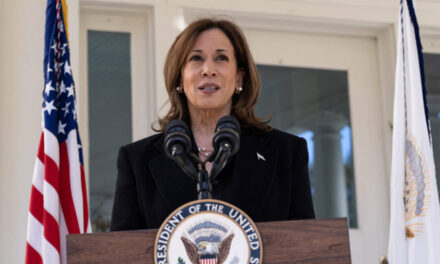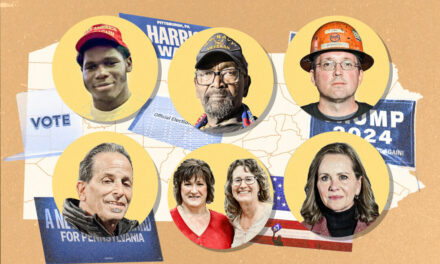We support our Publishers and Content Creators. You can view this story on their website by CLICKING HERE.
An analysis of past elections shows that third-party candidates have at times had significant impacts on the winner.
The 2024 presidential election features a lineup of third-party candidates running against Vice President Kamala Harris and former President Donald Trump who may or may not significantly impact the results on Election Day.
Not only were several of the battleground states decided with fewer than 30,000 votes in the 2016 and 2020 elections, but recent polls and election forecasters are predicting a narrow race that may fall within the margin of error for national and swing state surveys.
While third-party candidate impacts on past elections range from insignificant to monumental, any loss of votes for either Harris or Trump will likely affect the race—particularly since the four alternative candidates are on all or some of the ballots in battleground states.
This year, the prominent third-party candidates found on multiple state ballots are Independent Robert F. Kennedy Jr., who recently suspended his campaign; Jill Stein of the Green Party; Independent Cornel West; and Chase Oliver of the Libertarian Party. Other minor third-party candidates are running in various states.
“The only reason we are thinking about the third-party vote this year is because the election is historically close,” Aaron Dusso, a political science professor at Indiana University-Indianapolis, told The Epoch Times.
“While it seems unlikely that the third-party candidates combined will be able to crack two percent of the vote total nationally, taking just 10,000 votes in Michigan or Wisconsin might be more than the margin of victory for either Trump or Harris,” Dusso added.
These are the potential ways third-party candidates could influence who wins the 2024 presidential election.
Who Are the Candidates?
Kennedy, 70, had a long career as an environmental attorney that began in 1985. He is the son of former U.S. attorney general and senator Robert F. Kennedy, who was the brother of President John F. Kennedy.
Kennedy initially mounted a challenge against then-candidate President Joe Biden in the 2024 Democratic Party primary but dropped his bid in October 2023 to run as an Independent. After losing some support in national and battleground state polls, Kennedy suspended his campaign on Aug. 23 and joined the Trump team.
Stein, 74, is a doctor and activist who previously ran as her party’s candidate for president in the 2012 and 2016 elections. She is running on an anti-war campaign this year, focusing sharp attacks on the Biden administration’s military support for Israel in its war against the Hamas terrorist group. Stein is also a climate activist and supports the Green New Deal.
West, 71, is a philosophy and Christian practice professor at Union Theological Seminary in New York and formerly taught at Harvard and Princeton Universities. He was the first black student to receive a Ph.D. in philosophy from Princeton.
Oliver, 38, ran for office twice previously—in Georgia’s 5th congressional district race in 2020 to finish the term of deceased Rep. John Lewis (D-Ga.), a civil rights icon, and again in Georgia’s 2022 U.S. Senate race against Sen. Raphael Warnock (D-Ga.) and Republican Herschel Walker, which resulted in a runoff election.
Robert F. Kennedy Jr. speaks to reporters at the Pennsylvania Convention Center in Philadelphia, Pa., on Sept. 10, 2024. Madalina Vasiliu/The Epoch Times
Battleground Ballot Access
Stein is on every battleground state ballot besides Nevada, and West is on the Michigan, North Carolina, and Wisconsin ballots. Oliver, due to the Libertarian Party’s extensive past efforts toward election access, is on every single U.S. state ballot besides New York, Tennessee, and Illinois.
Wisconsin
In Wisconsin, many recent polls aggregated by FiveThirtyEight that feature third-party candidates omit Kennedy, including one survey from Redfield & Wilton Strategies that has Harris leading by 2 points. However, Suffolk University’s Oct. 28 poll includes Kennedy and has Trump leading by one point.
Michigan
The impacts in Michigan are even less clear, as none of the recent polls on FiveThirtyEight include Kennedy, creating a wild-card scenario if any of his supporters throw their weight behind him instead of Trump. Redfield has Harris and Trump tied in the Great Lakes State, with Stein and Oliver each receiving 1 point.
North Carolina, Pennsylvania
Redfield—which has Trump leading by 1 point in North Carolina—has Stein and Oliver both at 1 percent. An Oct. 23 Morning Consult poll has Trump leading by 3 points and both Oliver and Stein at 3 percent and 1 percent of the vote, respectively. The most recent poll to include West has his support at zero percent in North Carolina.
West also sued the North Carolina State Board of Elections to put his name on the ballot this year with the support of a small grassroots collective of progressives and working-class voters, which could pull votes from Harris.
Georgia, Arizona, Nevada
Similarly, in Georgia and Arizona, Stein and Oliver are receiving between zero and 2 percent of support, with Trump up by between 1 and 3 points over Harris. Stein, however, could appeal to Muslim American voters in Arizona. Oliver also ran in Georgia’s 5th congressional district race in 2020, which could pose problems for Trump.
The Stein Effect
When Trump defeated Clinton in 2016, he had the help of Stein, who clinched 1.1 percent of the popular vote, and Libertarian Gary Johnson, who carried 3.3 percent of the national vote. In a report, the American Bar Association pointed out that Johnson and Stein collectively earned more than 222,400 votes in Michigan, while Trump ultimately won the state by a roughly 15,600-vote margin over Clinton.
Green Party presidential candidate Jill Stein delivers remarks at Wilkes University in Wilkes-Barre, Pa., in this file photo. Christopher Dolan/The Citizens’ Voice via AP
Democrats have accused Stein of purposefully running a spoiler campaign to help Trump. During a recent rally in Dearborn, Michigan, headlined by Stein, Hassan Abdel Salam, a founder of “Abandon Harris,” said his goal was to “punish the vice president.”
The Democratic Party is releasing a slew of ads in the final weeks of the election targeting Stein in states like Michigan. One billboard ad reads, “Jill Stein Helped Trump Once. Don’t Let Her Do It Again.”
Will 3rd Party Candidates Affect the 2024 Election?
Third-party presidential candidates have had sizable impacts on some past elections, according to the American Bar Association. Ross Perot famously earned 18.9 percent and 8.4 percent in the 1992 and 1996 elections, respectively.
“This is a numbers game, and since the elections in all the swing states are close, a few thousand votes can make all the difference—but we don’t know for certain,” Robert Y. Shapiro, a political science professor at Columbia University, told The Epoch Times.
Stein will most likely take votes from Harris, and Kennedy may have limited impacts in Michigan and Wisconsin, Shapiro added. He also believes that current polls could be overestimating the third-party candidates’ support, as has been the case in previous elections where the final results were smaller than pre-election surveys. Some may stay at home, and others may select the candidate they dislike the least.
When comparing polls that feature both a two-way matchup between Trump and Harris and third-party candidates included, the results are “clear as mud,” Dusso said. In some instances both candidates see a slight gain in the multi-candidate context vs. a head-to-head race.
“We really do not know what the effect of the third-party candidates will be,” he added. “It’s easy to say that the Green party would take from the Democrats and the Libertarians would take from the Republicans, but I don’t think that is the case.”
He thinks many third-party supporters are protest voters who would potentially leave their ballots blank if they only had two options, mitigating some of their impact.
“While real votes, they are a mirage from the standpoint that either candidate could capture them,” Dusso said.
Even so, as Dusso pointed out, just 10,000 votes in a single battleground state could be enough to swing the election toward either Trump or Harris.

 Conservative
Conservative  Search
Search Trending
Trending Current News
Current News 







